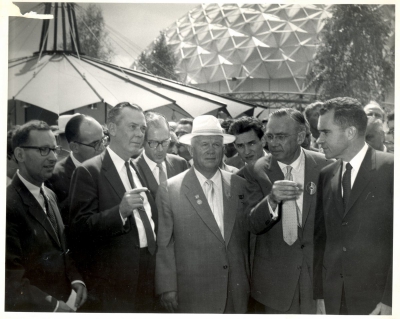The Kitchen Debate (Russian: , romanized: Kukhonnye debaty) was a series of impromptu exchanges through interpreters between U.S. Vice President Richard Nixon, then 46, and Chairman of the Council of Ministers Nikita Khrushchev, 65, at the opening of the American National Exhibition at Sokolniki Park in Moscow on July 24, 1959.
An entire house was built for the exhibition which the American exhibitors claimed that anyone in the United States could afford. It was filled with labor-saving and recreational devices meant to represent the fruits of the capitalist American consumer market. The debate was recorded on color videotape, and Nixon made reference to this fact; it was subsequently broadcast in both countries.
The American National Exhibition (July 25 to Sept. 4, 1959) was an exhibition of American art, fashion, cars, capitalism, model homes and futuristic kitchens that attracted 3 million visitors to its Sokolniki Park, Moscow venue during its six-week run. The Cold War event is historic for the Nixon-Khrushchev "kitchen debate" held first at the model kitchen table, outfitted by General Electric, and then continued in the color television studio where it was broadcast to both countries, with each leader arguing the merits of his system, and a conversation that "escalated from washing machines to nuclear warfare."But the event is equally renowned for its art exhibition, which included such celebrated artists as sculptors Robert Laurent, Ibram Lassaw and Isamu Noguchi and painters Hyman Bloom, Jackson Pollock and Edward Hopper in an art show coordinated by the United States Information Agency (USIA). Prior to the exhibition, the House Un-American Activities Committee (HUAC) threatened to remove many of the artists who had been accused of links to communist activities. After President Eisenhower intervened, however, the exhibition went on as planned.
Interpretations of the event are mixed. Some called the event a success because it humanized both countries, leading to better relations between them. Some also note that the event resulted in "a landmark contract to mass-manufacture Pepsi in the Soviet Union," creating new business opportunity, as well as a better relationship. But others argue that "[a] year later, the Cuban missile crisis brought both sides to the brink of nuclear war, and ties didn't begin improving until the 1970s." Meanwhile, liberal critics characterized the exhibition as an American Cold War "propaganda strategy."

1959Jul, 24
At the opening of the American National Exhibition in Moscow, U.S. Vice President Richard Nixon and Soviet Premier Nikita Khrushchev have a "Kitchen Debate".
Choose Another Date
Events on 1959
- 1Jan
Cuban Revolution
Fulgencio Batista, dictator of Cuba, is overthrown by Fidel Castro's forces during the Cuban Revolution. - 7Jan
Fidel Castro
The United States recognizes the new Cuban government of Fidel Castro. - 20Feb
John Diefenbaker
The Avro Arrow program to design and manufacture supersonic jet fighters in Canada is cancelled by the Diefenbaker government amid much political debate. - 8Apr
COBOL
A team of computer manufacturers, users, and university people led by Grace Hopper meets to discuss the creation of a new programming language that would be called COBOL. - 23Nov
Charles de Gaulle
French President Charles de Gaulle declares in a speech in Strasbourg his vision for "Europe, from the Atlantic to the Urals".

 English
English  español
español  français
français  português
português  русский
русский  العربية
العربية  简体中文
简体中文 